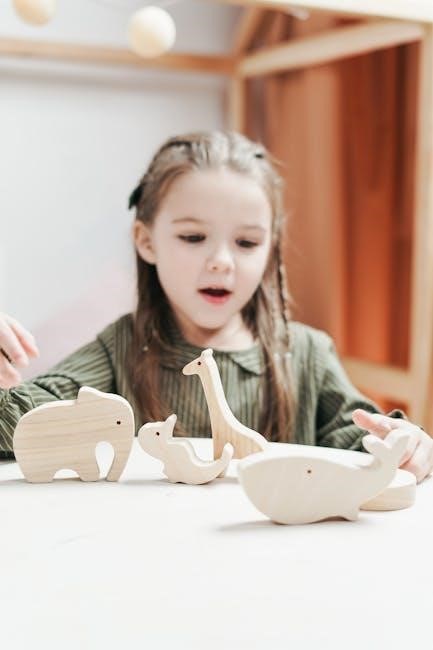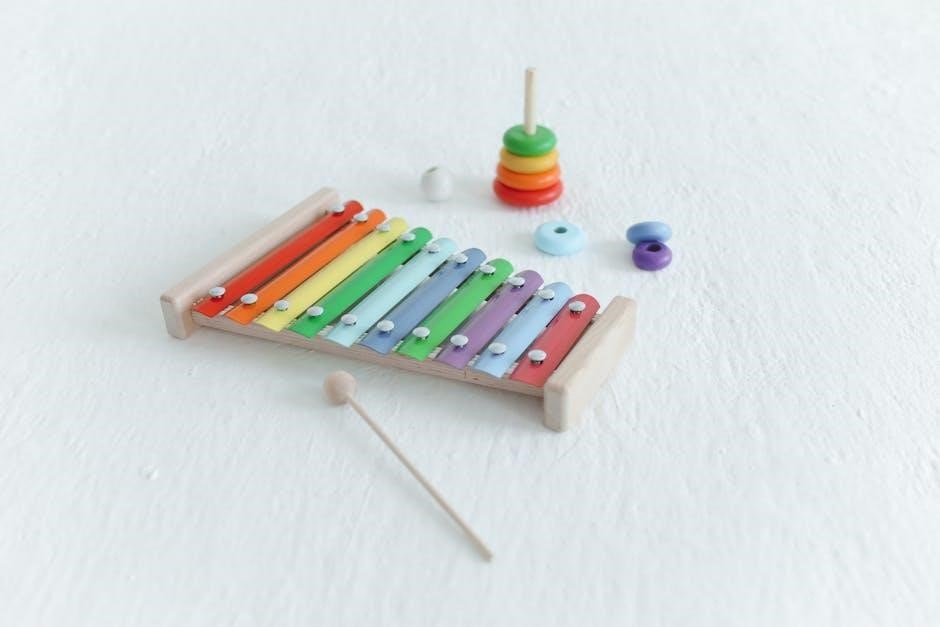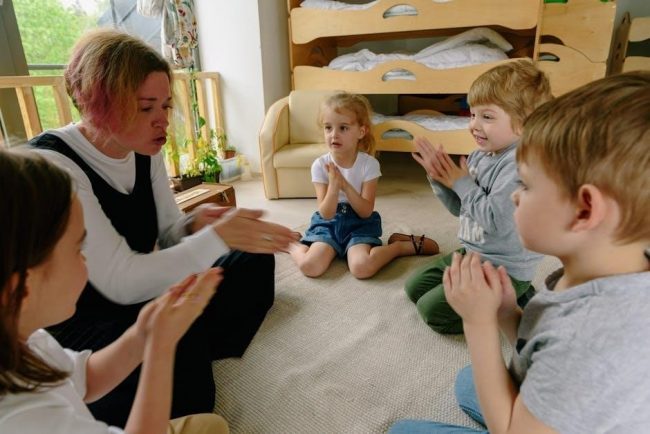Developed by Maria Montessori‚ the Montessori Method is a child-centered educational approach for ages 2.5–6 years. It emphasizes independence‚ critical thinking‚ and problem-solving through hands-on activities and self-directed learning.
Overview of the Montessori Philosophy
The Montessori philosophy‚ developed by Maria Montessori‚ focuses on child-centered learning‚ emphasizing self-directed activity‚ hands-on discovery‚ and collaborative play. It encourages children to explore their environment independently‚ fostering curiosity‚ creativity‚ and a love for learning. The approach respects each child’s unique pace and developmental needs‚ promoting holistic growth—intellectual‚ social‚ emotional‚ and physical. Teachers act as guides‚ supporting children as they engage with specially designed materials that promote conceptual understanding and practical life skills. This philosophy aims to nurture confident‚ independent‚ and compassionate individuals prepared to contribute positively to society. By focusing on the child’s natural desire to learn‚ Montessori education creates a foundation for lifelong success.
Key Principles of the Montessori Approach
The Montessori approach is built on several key principles‚ including self-directed learning‚ hands-on activity‚ and collaborative play. It emphasizes child-centered education‚ where children are encouraged to explore and discover concepts at their own pace. The prepared environment plays a crucial role‚ offering specially designed materials that foster independence and creativity. Mixed-age classrooms promote peer learning and socialization. Uninterrupted work periods allow children to develop concentration and problem-solving skills. Teachers act as observers and guides‚ supporting individual needs while fostering a sense of community. Practical life activities are integrated to build real-world skills and confidence. This approach nurtures curiosity‚ critical thinking‚ and a love for learning.
Montessori Syllabus Structure
The Montessori syllabus is structured around practical life‚ sensorial‚ math‚ and language activities‚ tailored for children aged 2.5 to 6 years‚ emphasizing hands-on learning and independence.
Primary Syllabus for Ages 2.5 to 6 Years
The primary Montessori syllabus for children aged 2.5 to 6 years focuses on holistic development through practical life‚ sensorial‚ math‚ and language activities. Practical life exercises‚ such as pouring and sorting‚ build independence and fine motor skills. Sensorial activities‚ including color and texture recognition‚ enhance sensory awareness. Math introduces concepts like counting and basic operations using specially designed materials. Language development involves phonetics‚ reading‚ and writing‚ encouraging a love for communication. This curriculum fosters self-directed learning and prepares children for future academic and personal growth‚ emphasizing individualized instruction and hands-on exploration.
Practical Life Activities
Practical Life Activities are a cornerstone of the Montessori syllabus‚ designed to develop independence‚ coordination‚ and confidence. These activities include tasks like pouring liquids‚ sorting objects‚ and caring for plants. They are structured to enhance fine motor skills and hand-eye coordination. By performing these tasks‚ children learn to work methodically and complete cycles of activity. Practical Life exercises also foster a sense of responsibility and self-reliance‚ encouraging children to contribute to their environment. These activities are tailored to the child’s developmental stage‚ ensuring a strong foundation for future learning and personal growth. They are essential for building a child’s ability to function independently.
Sensorial Exercises
Sensorial Exercises in the Montessori syllabus are designed to refine children’s senses‚ enhancing their ability to observe and distinguish sensory stimuli. These activities utilize specially crafted materials‚ such as colored rods‚ sound cylinders‚ and texture boxes‚ to help children develop visual‚ auditory‚ tactile‚ and olfactory discrimination. By engaging with these exercises‚ children improve their concentration and ability to focus. The exercises also lay a foundation for future academic skills by fostering a deeper understanding of their environment. Sensorial work encourages independence and self-directed learning while preparing children for more complex tasks. These exercises are integral to the Montessori approach‚ promoting holistic development and cognitive growth.
Math Curriculum
The Montessori Math Curriculum introduces children to mathematical concepts through hands-on materials and activities. Using bead manipulatives‚ sandpaper numbers‚ and number rods‚ children explore numerals‚ sequencing‚ and basic arithmetic. Practical life skills‚ such as sorting and counting‚ are integrated to build foundational math abilities. The curriculum encourages problem-solving and critical thinking‚ allowing children to progress at their own pace. By manipulating concrete materials‚ children transition from abstract ideas to tangible understanding‚ fostering a deep appreciation for mathematics. This approach ensures a solid foundation in numeracy‚ preparing children for more advanced mathematical concepts as they grow. The curriculum emphasizes independence and self-directed learning.
Language Development
The Montessori Language Development curriculum fosters a child’s ability to communicate effectively through structured activities. Using materials like sandpaper letters and moveable alphabets‚ children learn phonetics and word formation. Practical life activities enhance fine motor skills‚ preparing them for writing. The curriculum encourages self-directed learning‚ allowing children to progress at their own pace. Through hands-on experiences‚ children develop a strong foundation in reading and writing‚ fostering a lifelong love for language. This approach ensures independence and confidence in communication‚ aligning with the Montessori philosophy of individualized growth and development. The curriculum is designed to nurture creativity and critical thinking in young learners.

Benefits of the Montessori Curriculum
The Montessori curriculum fosters independence‚ enhances problem-solving skills‚ and encourages critical thinking. It builds confidence and promotes a lifelong love for learning in children.
Development of Independence
The Montessori curriculum places a strong emphasis on fostering independence in children. Through practical life activities‚ such as pouring‚ sorting‚ and care of the environment‚ children learn to perform tasks independently. This approach encourages self-reliance and confidence‚ allowing children to take ownership of their learning. The classroom is designed to promote autonomy‚ with materials and activities that enable children to work at their own pace without constant adult intervention. By mastering these skills‚ children develop problem-solving abilities and a sense of accomplishment‚ which are foundational for their emotional and cognitive growth. Independence is both a tool and an outcome in the Montessori method.
Cultivation of Problem-Solving Skills
The Montessori curriculum is designed to foster problem-solving skills through hands-on learning and discovery. Children are encouraged to explore‚ experiment‚ and think critically‚ allowing them to develop innovative solutions to challenges. Practical life activities‚ sensorial exercises‚ and mathematical concepts are tailored to promote logical reasoning and independence. The method emphasizes self-directed learning‚ enabling children to approach problems with confidence and creativity. By working with specially designed materials‚ children refine their ability to analyze situations and find effective solutions. This skill is not only beneficial in academics but also in everyday life‚ preparing children to navigate complex situations independently and effectively.
Encouragement of Critical Thinking
The Montessori Method places a strong emphasis on fostering critical thinking in children. By providing a structured yet flexible environment‚ children are encouraged to question‚ explore‚ and understand concepts deeply. The curriculum’s focus on hands-on learning and self-directed activities allows children to analyze information‚ evaluate ideas‚ and form reasoned conclusions. Through sensorial exercises and practical life activities‚ children develop the ability to observe‚ compare‚ and make informed decisions. This approach not only enhances academic performance but also equips children with the skills to think independently and make thoughtful choices in all areas of life‚ fostering a lifelong love of learning and intellectual growth.

Comparison with Other Educational Systems
The Montessori Method contrasts with systems like ICSE and CBSE by emphasizing self-directed learning and hands-on activities‚ fostering independence and critical thinking in students.
Montessori vs. ICSE vs. CBSE
The Montessori Method stands out for its child-centered‚ self-directed approach‚ fostering independence and critical thinking. In contrast‚ ICSE offers a more flexible‚ holistic curriculum with a focus on co-curricular activities‚ while CBSE follows a structured‚ exam-oriented framework. Montessori emphasizes hands-on learning and individualized instruction‚ whereas ICSE and CBSE rely on traditional teaching methods. Montessori’s focus on practical life skills and sensory development differs from the more academically oriented ICSE and CBSE syllabi. Parents choosing between these systems often consider their child’s learning style and long-term goals‚ with Montessori appealing to those valuing creativity and independence‚ and ICSE/CBSE suiting those preferring conventional academic rigor.
Role of the Teacher in the Montessori Classroom
The teacher observes‚ guides‚ and facilitates self-directed learning‚ using specialized materials to support children’s natural development and independence.
Guiding Children Through Self-Directed Learning
The Montessori teacher’s role is to guide children through self-directed learning‚ fostering independence and curiosity. They prepare the environment with specially designed materials that promote exploration and discovery. By observing each child’s interests and abilities‚ teachers introduce activities tailored to their developmental needs. This approach encourages children to take ownership of their learning‚ building confidence and problem-solving skills. The teacher acts as a facilitator‚ offering support when needed but allowing children to work at their own pace. This method ensures personalized growth and helps children develop a lifelong love for learning. The focus is on the child’s individual journey and progress.
Use of Specific Materials for Teaching and Assessment

The Montessori Method emphasizes the use of specially designed materials to facilitate learning and assessment. These materials are tailored to specific developmental stages‚ focusing on practical life‚ sensorial‚ math‚ and language skills. Teachers use these tools to guide children through hands-on activities‚ allowing them to explore and understand concepts independently. The materials are often self-correcting‚ enabling children to identify and learn from their mistakes. This approach not only enhances learning but also allows teachers to observe and assess each child’s progress effectively. The use of these materials is central to fostering independence‚ critical thinking‚ and a deep understanding of subject matter.

Montessori Syllabus Activities
Montessori syllabus activities include practical life exercises‚ sensorial experiences‚ math‚ language development‚ and cultural studies. These activities foster independence‚ curiosity‚ and a deep understanding of the world.
Moral Teaching and Hygiene
Moral teaching in the Montessori syllabus focuses on fostering respect‚ empathy‚ and social responsibility. Activities include lessons on grace‚ courtesy‚ and conflict resolution‚ promoting a harmonious classroom environment. Hygiene is integrated into daily routines‚ teaching children the importance of personal cleanliness and care for their surroundings. Practical life exercises‚ such as washing hands or organizing materials‚ reinforce these values. Moral education is seamlessly woven into cultural studies‚ encouraging children to understand and appreciate diversity. These teachings aim to develop self-respect‚ self-discipline‚ and a sense of community‚ preparing children to contribute positively to society while maintaining a clean and orderly environment.
Cultural Studies
Cultural studies in the Montessori curriculum introduce children to the world’s diversity through geography‚ history‚ and science. Activities include map exercises‚ storytelling‚ and hands-on materials that explore different cultures. This fosters curiosity and appreciation for global traditions‚ languages‚ and customs. Children learn about continents‚ countries‚ and their unique features‚ enhancing their understanding of human diversity. Cultural studies also integrate art‚ music‚ and literature‚ encouraging children to respect and celebrate differences. These lessons prepare children to be open-minded‚ empathetic‚ and culturally aware individuals‚ ready to engage with a global community while valuing their own heritage.
Assessment and Evaluation
Montessori assessment uses observation and specific materials to track progress. It identifies learning gaps and provides individualized support‚ fostering a developmental approach to education and growth.
Developmental Model of Teaching
The Montessori method employs a developmental model of teaching‚ focusing on individualized learning and observation. Teachers use specific materials to assess progress and identify learning gaps‚ ensuring personalized support. This approach emphasizes hands-on activities and self-directed learning‚ fostering independence and critical thinking. The curriculum is designed to adapt to each child’s developmental pace‚ promoting holistic growth. By aligning instruction with developmental stages‚ Montessori educators create a nurturing environment that encourages children to explore and learn at their own rhythm‚ building a strong foundation for future academic and personal success.
Identifying and Addressing Learning Gaps
The Montessori approach emphasizes early identification of learning gaps through continuous observation and assessment. Teachers use specialized materials to track progress‚ ensuring each child’s needs are met. By addressing gaps promptly‚ the method fosters a strong foundation for future learning. Individualized attention and tailored activities help bridge developmental delays‚ promoting holistic growth. This proactive strategy ensures children remain engaged and confident‚ building resilience and a love for learning that extends beyond the classroom.
